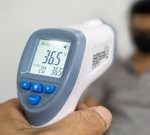
The isolation of the coronavirus pandemic might be stunting the social growth of young children, experts say. Since schools closed across the United States this past spring to stem the spread of COVID-19, kids have been deprived of experiences that are essential to their emotional development — playing at recess, sharing lunch with classmates and learning together in the classroom. In a recent HealthDay Live! interview, Dr. Dimitri Christakis, director of the Center for Child Health, Behavior and Development at Seattle Children’s Research Institute, and Dan Domenech, executive director of The School Superintendents Association, discussed how children might be impacted by the closure of their schools and the disruption of time spent with their peers. Humans are “social animals,” and the limitations placed on social interactions during the pandemic may harm mental health, particularly among children, they said. “We didn’t evolve for this kind of interaction with each other,” Christakis explained. “You can see it in young children. An infant as young as 6 months will attend to another infant. They want to engage with them socially. So, withholding all of that from children is making them pay a price, at least in the short term.” When schools open up, Christakis and Domenech said teachers and administrators should be prepared for a surge of mental health concerns among their students. “We’re working for our teachers… read on >

















